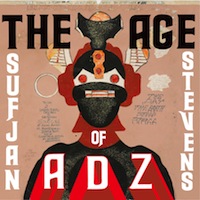10 Misleading Opening Tracks

Every album deserves a great opener. But not every album, great or less than great as the case may sometimes be, has an opening track that actually makes sense. Sometimes the first song is the weakest—not a terrible strategy if you’re building up to something, but you still need to keep your listeners’ attention. Sometimes the first song is actually the best, which makes the rest of the listen a bit of a disappointment. Sometimes the style is off. Sometimes the sound isn’t quite right. Sometimes it’s just an experimental mess that makes you wonder if you’re even playing the right record—or perhaps there was a pressing error. Whatever the case, we decided to put together a list of 10 misleading opening tracks, if only to act as a public service announcement that the album you are about to hear is not exactly how it immediately appears.
 The Jimi Hendrix Experience – “EXP”
The Jimi Hendrix Experience – “EXP”
from Axis: Bold as Love (1967; Reprise)
Jimi Hendrix was inconsistent with album openers. “Foxy Lady” made for a strong opening shot on Are You Experienced?, and “And the Gods Made Love” is a fine brief introduction to the sprawling Electric Ladyland. But the opener on Axis: Bold As Love? It’s basically a noise. Two minutes of bass notes, squealing feedback and bits of spoken word. It’s a peculiar intro only if you’re not expecting a noise or industrial record, which I’m guessing was not really what anyone was expecting in 1967. It’d be a few years yet before Throbbing Gristle made eardrum destruction fair game, but in the meantime, the bluesy psychedelic rock of the record surely must have been a welcome change of pace after that abrasive jolt. – JT
 Rolling Stones – “Sympathy for the Devil”
Rolling Stones – “Sympathy for the Devil”
from Beggars Banquet (1968; London)
It certainly feels a little funny to include one of The Rolling Stones’ signature songs on a list of misleading opening tracks. This immortal hit, classic song and live staple for four decades, misleading? Well, yeah. Beggars Banquet, the band’s seventh album, was released after the band had indulged in some flights of psychedelic fancy on Their Satanic Majesties Request, and in turn stripped back for a set of rootsy rock ‘n’ roll numbers, many of which were performed with primarily acoustic arrangements. There are some bluesy rock numbers, such as “Street Fighting Man” and “Stray Cat Blues,” as well as simple folk tunes like “Factory Girl.” But the album gets off the ground with the samba rhythms, R&B grooves and big arrangement of “Sympathy for the Devil,” the longest and most elaborate track on the album. Following Majesties, it almost suggests that more psychedelia is in store, albeit influenced more heavily by global sounds. Which isn’t to say the rest of the album is a disappointment, but it’s nothing like the iconic opening track. – JT
 King Crimson – “21st Century Schizoid Man”
King Crimson – “21st Century Schizoid Man”
from In the Court of the Crimson King (1969; Atlantic)
In a similar vein to “Sympathy for the Devil,” “21st Century Schizoid Man” is a song that, for many, defines a band. That band in question, King Crimson, is perhaps too complicated to be summarized with one song, not the least of reasons being that they’ve been through a number of lineup changes, and their ’60s output vs. ’70s output vs. ’80s and ’90s output all equates to very different listening experiences. Of course, they’ve been complicated from the beginning. Debut album In the Court of the Crimson King is a sprawling five-track sci-fi rock opera of sorts, and its opening track is a fiery, hard-rocking proto-metal song with jazz-fusion soloing and intense rhythmic changes. To some degree, that does define the band’s career, but the remainder of the album is far more low-key, the band’s progressive rock compositions more like ballads or slow-moving dirges of complex structures. They’re all brilliant, mind you, but nothing as spastic and frenetic as that first, magnificent anthem. – JT
 Talking Heads – “I Zimbra”
Talking Heads – “I Zimbra”
from Fear of Music (1979; Sire)
Nothing in Talking Heads’ discography prior to 1979’s Fear of Music sounded anything like “I Zimbra,” and for that matter, nothing else on the album does either. It’s a peculiar curiosity in the context of the record, an Afrobeat-inspired jam with lyrics informed by Dadaist poet Hugo Ball. The rest of the album is a deeper exploration of the arty, cerebal post-punk the band had recorded on the previous year’s More Songs About Buildings and Food, but even darker in tone (see: “Drugs,” “Life During Wartime”). Yet while “I Zimbra” is perhaps misleading in the context of the album, it was in fact a signal of where Talking Heads would go next, the whole of their next album Remain in Light deeply influenced by African music. Sometimes an opening track can prove to be a clue to sounds beyond the next 10 tracks. – JT
 David Bowie – “Loving the Alien”
David Bowie – “Loving the Alien”
from Tonight (1984; EMI)
For most of these albums, there’s a certain degree of analysis in terms of stylistic intent. If you’re making a post-punk album, why begin with a wholly unexpected Afrobeat exercise, for instance? With “Loving the Alien,” it’s much simpler: It’s one of only a couple songs on Tonight that aren’t truly, bafflingly bad. “Blue Jean” is the other obvious winner, and there’s a couple others that aren’t half bad. But once Bowie starts going reggae, boy howdy has the Thin White Duke lost his way. Not “Loving the Alien,” though. The longest song on the album, it opens in magnificent fashion, continuing the dramatic art pop of 1980’s Scary Monsters and 1983’s Let’s Dance with plenty of ’80s gloss. It’s surely one of his all-time greats, maybe not in the same league as “Heroes” or “Life on Mars?” or “Moonage Daydream” or “Station to Station,” but by god it’s a great song. Too bad it falls off a cliff after that. – JT
 Hüsker Dü – “Crystal”
Hüsker Dü – “Crystal”
from Candy Apple Grey (1986; Warner Bros.)
As long as there has been underground, there have been cries of “sell-out,” which is pretty much exactly the sort of backlash Hüsker Dü were up against when they signed to Warner Bros. in 1986, ushering in the release of their most ballad-heavy record, Candy Apple Grey. Compared to the band’s previous records, particularly Zen Arcade and New Day Rising, Candy Apple Grey had little in the way of the blistering hardcore numbers they’d made their name on in their prime years (though “Don’t Want to Know If You Are Lonely” rips, of course). There was one, however: “Crystal.” As the opening track for Grey, it gives a kind of false impression that this one’s going to be as much of a roller coaster ride as the ones before, when mostly the tones are muted or restrained. There’s still some noisy guitar of course, but nothing quite so intense. It’s almost as if the band included it as a pre-emptive strike against those who’d write them off for including more pianos on the album. – JT
 Napalm Death – “Evolved As One”
Napalm Death – “Evolved As One”
from From Enslavement to Obliteration (1988; Earache)
Ever since releasing debut album Scum back in 1987, British grindcore pioneers Napalm Death have invited in a fair amount of diversity into their characteristically blistering and intense metal/hardcore hybrid. But one thing that rarely changes is the sheer speed at which they attack each song. With second album From Enslavement to Obliteration, however, they kicked off the ceremony with something much slower and sludgier than anything else on the album. Naturally, it doesn’t stay that way, soon erupting into the 55 second guttural grunt-and-grind of “It’s a M.A.N.S. World!” But for three minutes, as if to offer an ominous warning of the violence to come, Napalm Death kept the BPMs down and the doom at a maximum, sounding for a moment much more like Swans than the power-drill style they pioneered shortly before. – JT
 Clap Your Hands Say Yeah – “Clap Your Hands!”
Clap Your Hands Say Yeah – “Clap Your Hands!”
from Clap Your Hands Say Yeah (2005; Self-released)
In a practically mocking fashion, Clap Your Hands Say Yeah’s debut LP kicks off with “Clap Your Hands!”, a head-scratching leadoff track for one of the most unrivaled indie pop albums of the 21st century. The carnivalesque opener of the 2005 self-titled release may be an unfair introduction to Clap Your Hands Say Yeah, yet is arguably the band’s leading mantra. Upon listening to the rest of the album, “Clap Your Hands!” can be retrospectively appreciated, as the group’s downright optimism pours into the choral dialogue between ringleader Alec Ounsworth and his glass-half-empty company. Amongst the initially perceived silliness in which Clap Your Hands Say Yeah introduce themselves is a much broader mission statement, preemptive of the melancholic positivity the band so eloquently captures. – PP
 Oneohtrix Point Never – “Nil Admirari
Oneohtrix Point Never – “Nil Admirari
from Returnal (2010; Editions Mego)
From an outside perspective, there probably isn’t anything terribly normal sounding on Onoehtrix Point Never’s Returnal. Indeed, it’s a spacey and strange album, full of alien effects and voices and general peculiarities. However, much of it is quite serene on the whole. It’s ultimately an album of cosmic ambient music, which is sometimes more hallucinatory than relaxing per se, yet it still relies more on atmosphere than beats or rhythms. That’s also true of “Nil Admirari,” but it’s even less relaxing, the composition a tangled web of noise-driven sonic chaos. Strange bits of sound collide and entangle into a highly unsettling and unnerving piece of music that’s, frankly, quite hard to sit through. It’s highly abrasive, which sort of makes the remainder of the album all the more welcoming. Which is to say it’s likely a highly intentional move, but it definitely gets things off the ground in an uncomfortable way. – JT
 Sufjan Stevens – “Futile Devices”
Sufjan Stevens – “Futile Devices”
from The Age of Adz (2010; Asthmatic Kitty)
The Age of Adz is a big album. It’s overwhelming, even, full of distorted beats and dense electronic arrangements with big synths, strings and odd effects. It’s an odd entry in Stevens’ catalog, which on the whole mostly comprises beautifully arranged indie folk and pop, instead favoring an arty electronic approach that climaxes in the dizzying sprawl of “Impossible Soul,” all 25 minutes of it. But it doesn’t start off that way. Its actual opening track, “Futile Devices,” is two minutes of gentle acoustic instruments, primarily guitar and prepared piano, setting a graceful and gentle tone for the album to follow. And it wouldn’t have been all that surprising had Stevens chosen that path for the rest of the record. But he absolutely didn’t, instead offering this one track as the shortest of bridges between what we knew of his work before and where it was to go next. – JT

